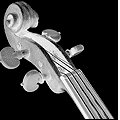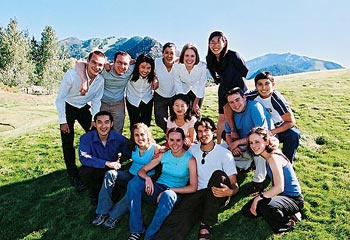
|
|||||||||
 |
| The
View from Aspen: A Window on Conservatory Life By Maria Balducci '04
I was thrilled by the prospect of attending the Aspen Music Festival and School last June since it would allow me to dedicate nine long weeks to one specific aspect of my life. Because I am a double-degree student majoring in piano performance and English, as well as a varsity softball athlete, I constantly shift my time and focus between interests. In Aspen's intense and challenging atmosphere I would be able to test my dedication and measure my passion for music, factors that seem of extreme importance as graduation - the time to choose which path to take - nears. Not that my three and a half years at Oberlin haven't offered me a similarly intense musical experience. The Con-servatory's faculty members, outstanding professionals in their own right, maintain a consistently superior standard for their highly talented students. My piano teacher, Sanford Margolis, my professors, and especially my classmates - a gifted and intelligent group - teach and challenge me as a musician every day. At the same time, we build a very special community for ourselves, one that is comforting and supportive and in which our friendships endure. This was nowhere more evident than at Aspen, where I was constantly surrounded by Oberlin students and alumni. The festival's music director, David Zinman, is a 1958 graduate of Oberlin, and more than 20 of the nearly 750 students enrolled at Aspen last summer were either current Oberlin students or recent graduates. We formed a lively and unmistakable sub-community; other Aspen students gained a new respect for Oberlin upon seeing our strong, family-like group. One of them jokingly said to me, "I can't escape you Oberlin people - you're everywhere!" Such a high level of participation from one school is due largely to the generosity of Thomas J. Klutznick '61, chair of Oberlin College's Board of Trustees. He not only offers annual financial assistance to each Oberlin student attending Aspen, but he also invites the Oberlin "family" to his home for an evening of music, conversation, and amazing food. Mr. Klutznick believes there is something to be learned from Aspen's mountains: "They are so much bigger than we are," he says. "You are almost forced to compete with the magnificent 14,000-foot peaks. A kinetic kind of feeling comes out of these vast, soaring hills. You can be at peace or you can be in the most furious weather - the mountains form the foundation for what happens here. The issue is one of glory: can you measure up?" And that was what I was doing in Aspen; taking the measure of where I stood relative to the glory of music. Aspen is a unique and beautiful place. Nestled in the midst of the grand Rockies, the town is small and picturesque, full of restaurants and shops, beautiful homes, and the sounds of music from student street performances. The extraordinary architecture and landscape leave a lasting impression. Mountains and water surround the music school, which is situated along Castle Creek. The comforting sound of flowing water can be heard in every building and practice room, all of which afford views of the huge mountains. The music tent, where most performances took place, was on the outskirts of town, nestled among the peaceful aspen trees. Occasionally, on clear, sunny days, I would hike to the top of a mountain and enjoy the perfect view. I could hardly ask for anything more, and yet I was given more: a "proximity to musical greatness," as one friend put it. I was overwhelmed by my nearness to some of the best musicians in the world. I attended inspiring master classes and performances by the Emerson and American string quartets, Yefim Bronfman, Leon Fleischer, Béla Fleck, Edgar Meyer, and Joshua Bell. I have attended performances by great musicians before, but never with the chance to meet them and get to know them personally, as I did at Aspen. I took lessons from Ann Schein and heard her stories about her teachers Arthur Rubinstein and Dame Myra Hess. I played softball every Monday morning with Ray Mase and John Rojack from the American Brass Quintet and met their families. I participated in a master class with David Finckle and Wu Han. I ran into Edgar Meyer in the grocery store and chatted with him, then found myself backstage meeting Yefim Bronfman after he played the Brahms concerti in a captivating concert. Knowing these outstanding musicians as normal people in their everyday lives was reassuring and taught me something about what makes them exceptional, not only in their musicianship, but also in their ability to deal with the challenges and difficulties of a life in music. I realized that they once were students like us - vulnerable, offering our hearts and voices through our music, placing the most fragile and essential part of ourselves in front of strangers as well as friends. Doing that well requires a unique combination of sensitivity and strength: the natural sensitivity needed to be truly expressive coupled with a subtle power and confidence evident in that expressiveness. The world-famous musicians I met at Aspen have that sensitivity and strength. Moreover, they have cultivated work ethics as intense as their love and passion for music. Ulti-mately, they remain real people who simply have dedicated their lives to music, who possess an understanding and accept- ance of a musician's responsibility, and consequently, a deep respect for the music itself, which overflows to the listener. I had arrived in Aspen with a certain innocent anticipation. I left nine weeks later more mature, with a deeper love for music and a greater respect and appreciation for musicians. I came to an understanding of how very difficult but incredibly rich a career - a life - in music can be. Like the mountains of Aspen, that life requires a risky climb. A few times while hiking in the Rockies this past summer I was struck with the idea that it would be easier to go back down and choose a smaller mountain. I sometimes have similar thoughts about the path I've chosen in life, but I cannot ignore the foundation sustaining me, especially when I recall the many glorious moments in Aspen. Although difficult, it is possible to reach the top. And more important, and rewarding, is the climb itself. II Maria Balducci, a senior from New Carrollton, Maryland, is captain of the softball team and music director of the Newman Catholic Community. The photo of Maria (seated center) and some of the Oberlinians who took part in the 2002 Aspen Festival was taken by Alex Irvin. |
||

